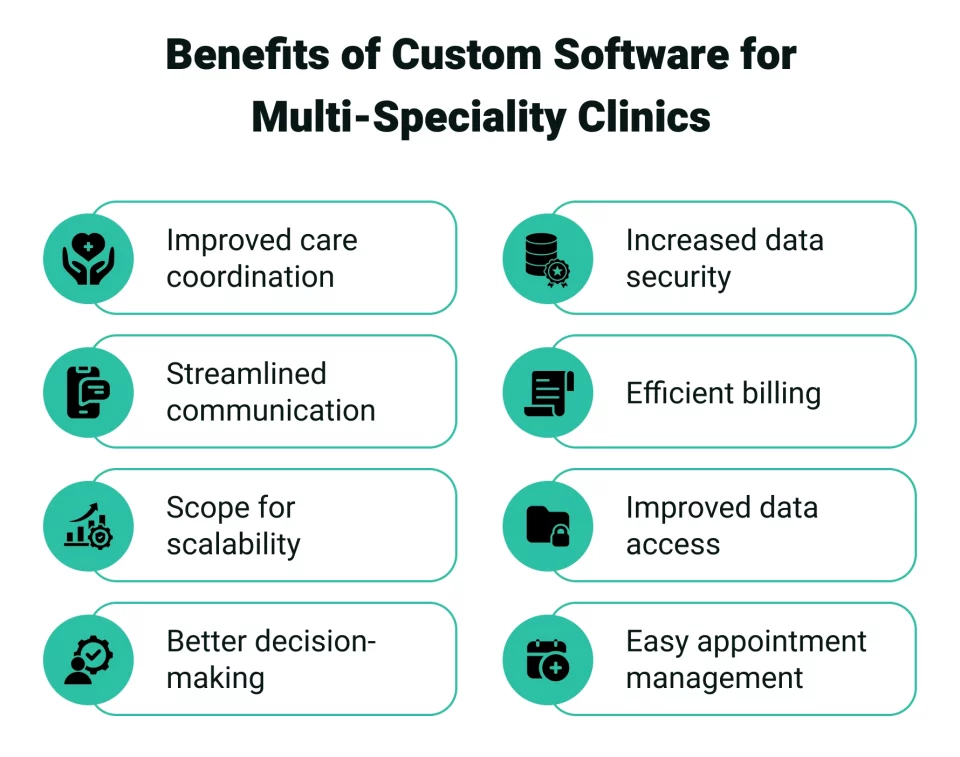INTRODUCTION
Custom software enhances effectiveness in multi-specialty clinics
Multi-specialty clinics represent the future of healthcare, offering diverse services under one roof to cater to a wide range of patient needs. However, managing such complex operations is no small feat. These clinics face unique operational challenges, from juggling high patient volumes and coordinating multiple specialties to optimizing resource allocation. Ensuring seamless communication between departments, maintaining quality care standards, and streamlining administrative tasks further add to the complexity. To tackle these challenges, clinics require robust tools that can adapt to their dynamic environments—this is where custom software solutions come into play.
Custom software brings unmatched flexibility and functionality to multi-specialty clinics, transforming how they manage operations. Unlike generic software, custom solutions are designed to address the specific pain points of a clinic. For instance, they can integrate scheduling systems across all specialties, improving resource utilization and reducing patient wait times. Advanced features like automated billing, personalized patient communication, and unified electronic health records (EHR) enhance administrative efficiency and patient experience. Tailored software ensures that every process, from appointment booking to post-visit follow-ups, aligns seamlessly with the clinic's workflow.
Moreover, custom software's integration capabilities make it a game-changer for multi-specialty clinics. Custom solutions can bridge the gap between disparate systems, such ahs laboratory services, imaging departments, and specialty care units. This interoperability fosters better collaboration and data sharing among departments, enhancing the accuracy of diagnoses and treatment plans. Additionally, clinics can incorporate advanced analytics into their software to gain insights into operational bottlenecks, patient trends, and resource utilization, enabling informed decision-making and continuous improvement.
Investing in custom software addresses operational challenges and positions multi-specialty clinics for growth in a competitive healthcare landscape. Clinicians can focus more on delivering high-quality care by optimizing workflows, improving patient satisfaction, and reducing inefficiencies. Furthermore, as healthcare evolves toward value-based care models, custom solutions empower clinics to meet emerging demands by enhancing patient outcomes and overall clinic performance. Ultimately, tailored software is not just a tool but a strategic asset for multi-specialty clinics aiming to achieve excellence in service delivery.
NEED
Custom solutions help multi-specialty clinics achieve comprehensive care
Generic clinic management software may work well for small or single-specialty practices, but it often falls short when applied to the complex operations of multi-specialty clinics. These software solutions typically lack the flexibility to handle diverse workflows across different specialties, resulting in inefficiencies and operational silos. For instance, a system designed for general practice might need help managing the unique scheduling needs of a cardiology department or the billing complexities of radiology services. Additionally, generic software often fails to integrate seamlessly with other systems like diagnostic tools or lab management platforms, leaving clinics with disconnected data and fragmented patient records.
Customized software, on the other hand, is designed to address these limitations by accommodating the unique demands of multi-specialty clinics. Such solutions can support specialty-specific workflows, ensuring that every department operates at peak efficiency without compromising the overall functionality of the clinic. For example, custom software can incorporate tailored appointment scheduling modules, adapt to unique documentation requirements for different specialties, and streamline interdisciplinary communication. By aligning software capabilities with the clinic's operations, custom healthcare software solutions reduce redundancies and enhance collaboration across departments.
Moreover, custom software excels at integrating data from various sources, offering a unified platform for patient management and operational oversight. Clinics can seamlessly combine data from electronic health records (EHR), imaging systems, lab reports, and billing platforms to create a comprehensive patient profile. This improves the quality of care by providing clinicians with a holistic view of patient information and enhances patient experiences by minimizing errors and redundancies. With custom software, multi-specialty clinics gain the tools they need to overcome operational challenges and elevate their services, making it a necessity rather than a luxury in today’s healthcare landscape.
Want to know how custom software can revolutionize how multi-specialty clinics operate and deliver care?
SOFTWARE IMPACT
Custom software solutions can redefine efficiency and elevate patient care to new heights
Multi-specialty clinics face unique challenges in managing diverse specialties, coordinating patient care, and maintaining operational efficiency. These complexities demand solutions beyond generic software, which often lacks the flexibility and precision needed to address the distinct needs of each department. Custom software emerges as a game-changer, offering tailored functionalities that streamline clinic operations, enhance patient experiences, and improve inter-departmental collaboration. By aligning technology with the clinic's specific workflows and goals, custom solutions empower multi-specialty clinics to deliver exceptional care while optimizing their resources.
Streamlined appointment scheduling across specialties
Managing appointments in a multi-specialty clinic can be a logistical challenge, with overlapping schedules, varying patient needs, and inter-departmental referrals. Custom software simplifies this complexity by providing a unified scheduling platform tailored to the clinic’s needs. It allows specialty-specific appointment settings, ensuring each department’s unique time requirements are considered. For example, a dermatology consultation might require a shorter time slot than a diagnostic cardiology session, and the software can automatically adjust scheduling parameters to reflect these differences.
Additionally, custom solutions help reduce appointment overlap and errors by synchronizing calendars across all departments. This means that referrals from one specialty to another—such as a general practitioner referring a patient to orthopedics—can be seamlessly scheduled without manual coordination. Patient self-scheduling capabilities further enhance convenience, allowing patients to choose available slots through a user-friendly portal. Features like automated reminders and notifications minimize no-shows, while real-time updates ensure that changes are immediately communicated to patients and staff.
With a custom scheduling solution, clinics can also better manage patient flow and resource allocation. Specialty-specific availability management ensures that key resources, such as diagnostic equipment or specialized staff, are optimally utilized. This enhances operational efficiency and creates a smoother, more satisfying experience for patients navigating multiple specialties in a single clinic.
Comprehensive patient data integration and access
Custom software centralizes patient data from multiple specialties into a single, unified system, creating a seamless flow of information. This eliminates the silos often seen in clinics using generic solutions, where each department operates independently, resulting in fragmented records. By integrating electronic health records (EHR) with lab results, diagnostic images, and treatment plans, custom software ensures all relevant information is readily accessible in one place.
This integration enables clinicians to access complete patient histories instantly, reducing time spent searching for records or requesting updates from other departments. For example, a neurologist can review test results ordered by a general practitioner without delay, facilitating timely and informed decisions. Such a unified system reduces the duplication of tests, saves costs, and minimizes patient inconvenience.
Additionally, centralized data supports better care coordination between departments. If a patient sees multiple specialists, custom software ensures that all providers have a real-time view of the patient’s status, fostering collaboration on treatment plans. Enhanced data integration also improves communication between clinics and external healthcare facilities, ensuring continuity of care for patients transitioning between providers.
Moreover, custom software's secure yet accessible nature allows authorized staff to access data anytime, anywhere, through cloud-based platforms. This flexibility is critical in emergencies, where quick access to accurate information can significantly improve patient outcomes.
Efficient billing and revenue cycle management
Billing in a multi-specialty clinic involves different fee structures, insurance requirements, and coding standards for each department. Custom software streamlines these processes by creating tailored billing workflows that address the specific needs of every specialty. From automating charge capture to ensuring accurate coding, the software eliminates bottlenecks that generic solutions often fail to address.
Customized insurance claim management is another significant advantage. With built-in rules and validation checks, the software reduces the risk of claim denials and accelerates reimbursement processes. For example, it can automatically verify insurance eligibility and flag errors before submitting claims. By consolidating revenue data across specialties, clinics gain a clear view of financial performance, enabling them to identify trends, optimize revenue cycles, and reduce operational costs.
Moreover, tailored software simplifies patient billing by generating transparent, itemized invoices that reflect services from multiple specialties. It can also integrate with payment gateways to offer flexible payment options, enhancing patient satisfaction. For clinics handling high volumes and complex transactions, custom billing solutions ensure no revenue opportunity is missed while maintaining compliance with regulatory requirements.
Improved care coordination between specialties
Effective care coordination is the backbone of successful multi-specialty clinics, and custom software takes this to a new level by fostering seamless communication and collaboration between departments. By integrating patient records and enabling real-time data sharing, custom solutions ensure that all providers can access accurate and up-to-date information. This eliminates redundancies, reduces errors, and supports a more cohesive approach to patient care.
Digital referrals are a standout feature, streamlining the process of transferring patients from one specialty to another. For instance, a patient referred from primary care to endocrinology can have all relevant records, lab results, and notes automatically shared with the receiving department. Custom software facilitates inter-departmental communication through shared notes and secure messaging, allowing clinicians to collaborate effectively on treatment plans.
Coordinated treatment planning is another key benefit, particularly for patients with chronic conditions or complex healthcare needs. For example, cardiologists, nutritionists, and physical therapists can collaborate within the same platform to align their strategies, ensuring a unified approach to patient care. With these capabilities, custom software empowers multi-specialty clinics to deliver efficient and comprehensive care, significantly improving patient outcomes and satisfaction.
Enhanced patient experience and satisfaction
Custom software enhances patient experiences by providing tools designed to address their needs and preferences. Patient portals offer a convenient way to access medical records, schedule appointments, and communicate with healthcare providers, all in one place. These portals are tailored to include features like specialty-specific information, ensuring relevance and usability for patients of various departments.
Automated reminders for appointments, follow-ups, and medications help patients stay engaged with their care plans. These reminders benefit patients and clinics by reducing missed appointments and ensuring treatment adherence. Streamlined check-in and check-out processes, such as digital kiosks or mobile check-ins, minimize wait times and improve overall satisfaction.
Online payment options simplify the patient experience, allowing quick and secure transactions directly from the portal. Patients can view itemized bills, track past payments, and set up payment plans if needed. Additionally, easy access to test results, educational resources, and personalized health tips empowers patients to participate actively in their health management.
Telemedicine features integrated into custom software take patient convenience to the next level. From virtual consultations to specialty-specific care plans, these tools make it easier for patients to connect with the right providers without traveling, enhancing accessibility and satisfaction.
Specialty-specific reporting and analytics
Custom healthcare software development services provide multi-specialty clinics with robust reporting and analytics capabilities tailored to each department's needs. Specialty-specific reports give clinics granular insights into operational performance, allowing them to identify trends and address inefficiencies. For example, clinics can analyze patient wait times to improve scheduling or assess treatment outcomes to refine care protocols.
These analytics also support financial performance tracking, breaking down revenue and expenses by specialty. A clinic can, for instance, evaluate which services generate the most revenue or where resource allocation can be optimized. This level of detail is invaluable for making informed decisions about growth strategies and resource investment.
Operational metrics, such as staff utilization and equipment usage, are another area where custom analytics shine. By monitoring these factors, clinics can balance workloads, reduce bottlenecks, and ensure that resources are deployed where needed. Such insights improve efficiency and enhance the patient experience by minimizing delays and maximizing the quality of care.
Predictive analytics takes this further by forecasting future needs based on historical data. Whether anticipating patient volumes, scheduling staff, or planning for equipment upgrades, custom software enables clinics to stay ahead of demand, ensuring smooth operations and sustained excellence across specialties.

Custom software is the secret weapon behind successful multi-specialty clinics
CHALLENGES & SOLUTIONS
Implementing custom software in multi-specialty clinics is a daunting task
Implementing custom software in multi-specialty clinics is a transformative step toward improving efficiency and patient care, but it comes with challenges. From managing costs and training staff to ensuring seamless data migration and regulatory compliance, clinics must address several complexities. These challenges, however, are manageable when approached with a clear strategy and the right expertise. By partnering with experienced healthcare software developers and adopting a phased well-planned implementation approach, clinics can overcome obstacles and unlock the full potential of custom solutions tailored to their unique needs.
High implementation costs
One of the most significant challenges of custom software is the upfront investment, which can be a concern for multi-specialty clinics operating on tight budgets. The cost includes development, deployment, and ongoing maintenance. To mitigate this, clinics can prioritize must-have features and implement the software in phases, spreading the investment over time. Partnering with experienced developers who understand cost-efficient strategies ensures that the software delivers maximum ROI without unnecessary expenses.
Staff training and adoption
Introducing custom software often requires staff to adapt to new systems and workflows, which can lead to resistance or slower adoption. To overcome this, clinics should include staff in the design process to ensure the software aligns with their daily tasks. Comprehensive training programs, ongoing support, and intuitive user interfaces make the transition smoother. Experienced developers can create user-friendly solutions that minimize the learning curve and encourage engagement.
Data migration complexities
Migrating data from existing systems to new custom software can be time-consuming and prone to errors. Clinics must ensure that patient records, appointment histories, and billing information are transferred securely and accurately. This challenge is best addressed by partnering with developers experienced in data migration, who use robust tools and processes to ensure a seamless transition. Clinics should also allocate time for thorough testing and validation to avoid disruptions during go-live.
Integration with existing systems
Multi-specialty clinics often rely on multiple systems, such as EHRs, billing software, and diagnostic tools. Ensuring the new custom software integrates seamlessly with these existing systems can be a technical hurdle. Custom solutions should be designed with interoperability in mind, leveraging APIs and standards like HL7 or FHIR for smooth data exchange. Working with developers specializing in healthcare integrations ensures that the software complements the clinic's ecosystem rather than disrupting it.
Maintaining regulatory compliance
Healthcare software must comply with regulations such as HIPAA, GDPR, or other regional standards, which can add complexity to development and implementation. Non-compliance risks not only financial penalties but also patient trust. To address this, clinics should work with developers well-versed in healthcare regulations and can incorporate compliance features from the ground up. Regular audits and updates ensure that the software meets evolving legal requirements.
Custom software can streamline processes in multi-specialty clinics. Want to know how?
CONCLUSION
Custom software can revolutionize the way multi-specialty clinics deliver care
In today’s dynamic healthcare landscape, the complexities of managing multi-specialty clinics demand solutions that are as versatile and adaptive as the clinics themselves. Custom software emerges as a transformative tool, addressing challenges like fragmented data, inefficient workflows, and patient engagement with precision and scalability. By centralizing operations, facilitating seamless care coordination, and offering tailored functionalities for diverse specialties, custom software empowers clinics to elevate their efficiency while delivering exceptional patient care.
As multi-specialty clinics grow in size and scope, the need for innovative, technology-driven solutions becomes increasingly essential. Custom software meets these needs and enables clinics to stay competitive in a rapidly evolving industry. Partnering with experienced healthcare software developers ensures a robust solution aligned with the clinic’s long-term goals. By investing in custom software, clinics can streamline operations, improve patient outcomes, and set a solid foundation for sustainable growth.
People Also Ask (PAA) questions
- What is a multi-specialty clinic?
A multi-specialty clinic is a healthcare facility that houses professionals from various medical specialties under one roof. It provides comprehensive care by offering various diagnostic, treatment, and preventive services for different medical conditions. - How does custom software benefit healthcare organizations?
Custom software offers tailored solutions that align with healthcare organizations' specific workflows and needs. It enhances efficiency, improves patient care, supports regulatory compliance, and integrates seamlessly with existing systems for better resource management. - Why is custom software important for multi-specialty clinics?
Custom software is crucial for multi-specialty clinics as it accommodates diverse workflows, streamlines inter-departmental coordination, and centralizes data management. It ensures operational efficiency, supports specialty-specific needs, and enhances the overall quality of patient care. - What are the main features of clinic management software?
Clinic management software typically includes appointment scheduling, electronic health records (EHR), billing and revenue cycle management, patient portals, reporting tools, and inventory tracking. Custom software can also incorporate specialty-specific features as needed. - How can software improve patient experience in healthcare?
The software enhances the patient experience by offering features like online appointment scheduling, secure communication portals, access to health records, personalized reminders, and telemedicine options. These tools improve convenience, engagement, and satisfaction. - What are the challenges of implementing custom healthcare software?
Challenges include high initial costs, staff training requirements, data migration complexities, integration with existing systems, and maintaining regulatory compliance. Working with experienced developers and a clear implementation strategy helps overcome these obstacles. - How does patient data integration work in multi-specialty clinics?
Patient data integration involves consolidating information from various departments into a centralized system. This enables seamless data sharing across specialties, providing clinicians with real-time access to comprehensive patient records, lab results, and treatment plans. - What are the benefits of custom software for clinic management?
Custom software offers tailored workflows, improved efficiency, better resource utilization, and enhanced patient care coordination. It also supports specialty-specific needs, robust reporting, and compliance with healthcare regulations. - How does software help with billing in healthcare?
Healthcare software streamlines billing by automating processes like claim generation, submission, and tracking. It ensures accuracy, reduces errors, and simplifies revenue cycle management while accommodating the unique billing needs of different specialties.






